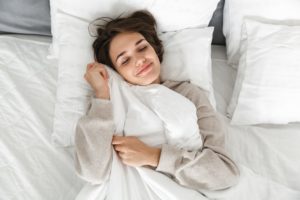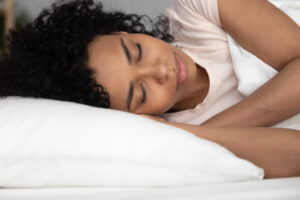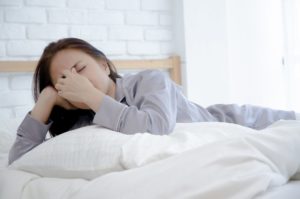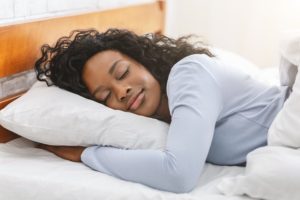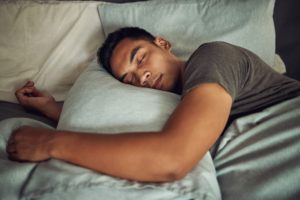When you buy through our links, we may earn a commission. Products or services may be offered by an affiliated entity. Learn more.
How Much Deep Sleep Do You Need?
- Adults typically spend up to 20% of their night in deep sleep.
- During deep sleep your body strengthens muscle, bones, tissue, and immune function.
- Deep sleep occurs multiple times throughout the sleep period, but factors like insomnia, stress, and aging can affect duration of deep sleep.
- Get more deep sleep by taking a warm bath, improving your diet, or listening to binaural beats before bed.
Deep sleep supports the repairing and restorative functions that are necessary to feel your best each day. Getting enough deep sleep helps the brain and body prepare to take on new information and adapt to new environments. Not getting enough deep sleep can cause learning difficulties, make you susceptible to infection, and put you at risk for long-term health concerns.
Are You Getting Enough Deep Sleep?
A variety of issues can cause degrade your sleep quality. Answer three questions to understand if it’s a concern you should worry about.
What Is Deep Sleep?
Deep sleep, also called slow-wave sleep, occurs in the third stage of non-rapid eye movement (NREM) sleep. During deep sleep, electrical activity in the brain appears in long, slow waves called delta waves. These waves have a frequency of 0.5 to 2 Hertz and they must make up at least 6 seconds of a 30-second window for that period to be considered deep sleep.
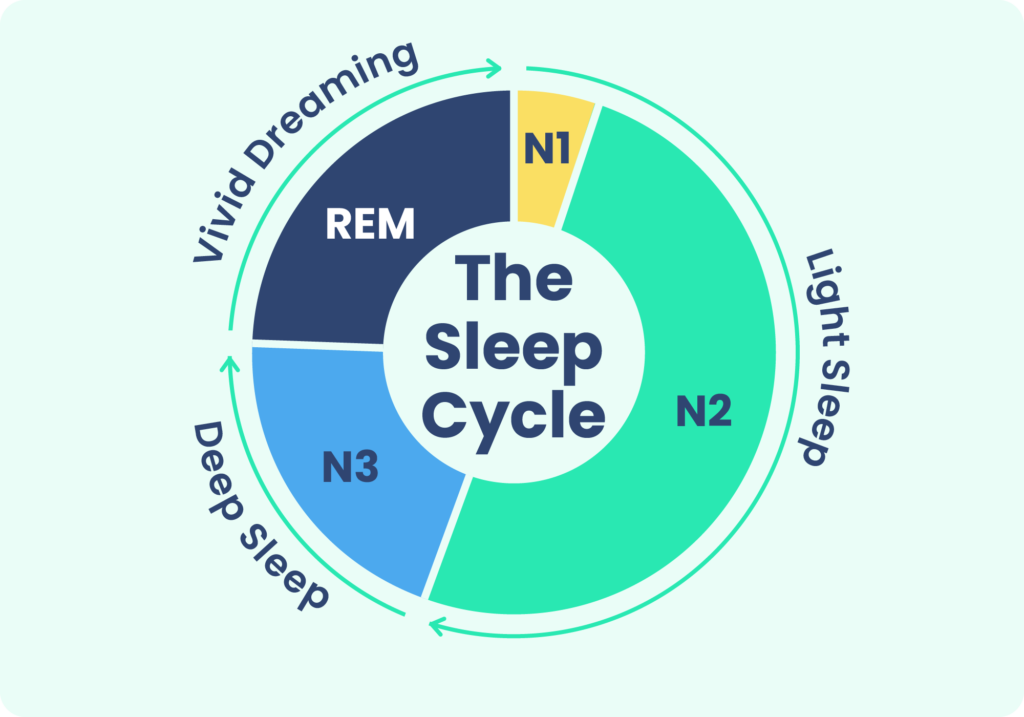
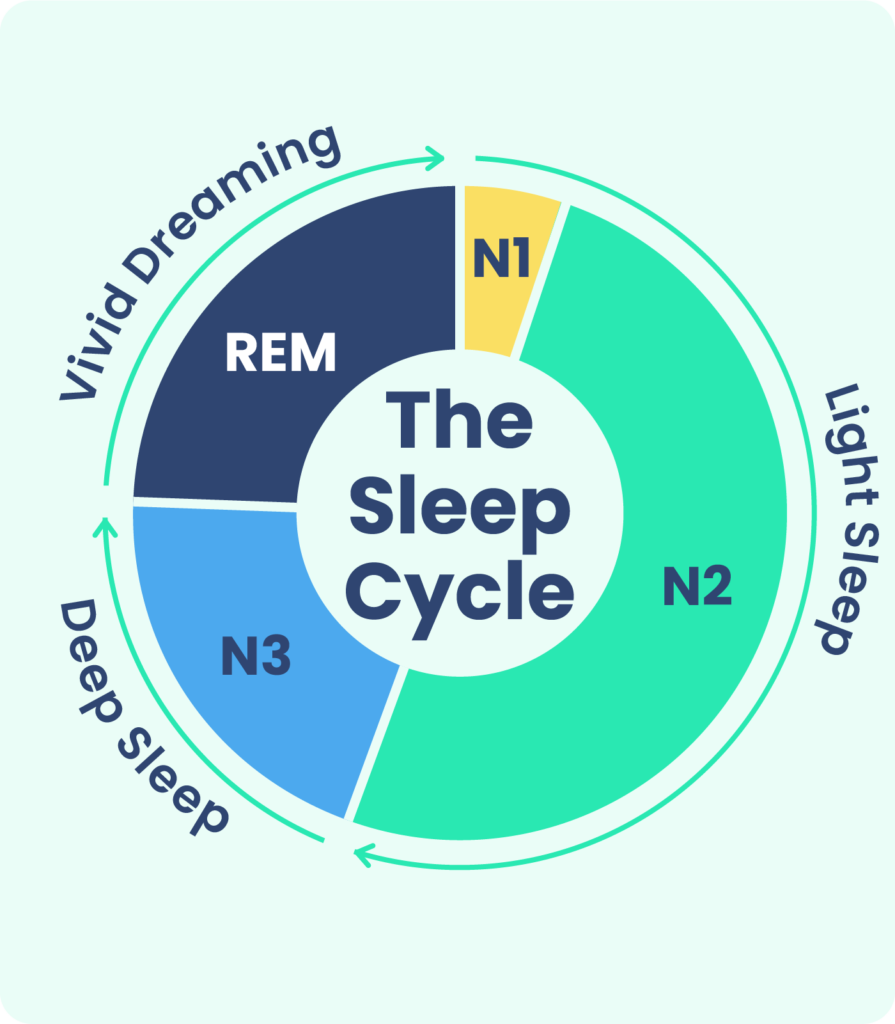
Typically, you descend into deep sleep within an hour of falling asleep, and experience progressively shorter periods of deep sleep as the night wears on. During deep sleep, body functions like breathing and heart rate are also very slow and your muscles are relaxed. It can be difficult for someone to wake you up, and waking up out of deep sleep may make you feel mentally foggy for up to an hour.
What Are the Other Stages of Sleep?
Once you fall asleep, your body cycles through three non rapid eye movement (NREM) stages of sleep followed by one rapid eye movement (REM) stage. It usually takes between 90 and 120 minutes to cycle through all four stages, after which the cycle starts again. Adults typically have four to six cycles per night. In the first half of the night you spend more time in NREM sleep. However, as the night goes on, you spend more and more time in REM sleep.
- Stage 1: This brief, drowsy stage marks the transition to sleep, when your breathing and heartbeat start to slow down.
- Stage 2: In this stage of light sleep, your breathing and heart rate slow even more. Your temperature drops, and your muscles relax. Stage 2 sleep lasts longer in each cycle throughout the night. About half of your total sleep every night is spent in this stage.
- Stage 3: Stage 3 sleep represents the deepest sleep of the sleep cycle, when brain waves are at their slowest in frequency and highest in amplitude.
- REM: As the name suggests, your eyes move quickly beneath your eyelids during REM sleep. Your brain activity is similar to that of a person who is awake. However, your muscles usually do not move. Experts believe most of our dreaming happens during REM sleep.
How Much Deep Sleep is Enough?
To calculate how much deep sleep you need, first determine how much sleep you need overall. Most adults should aim for at least seven hours of sleep each night. Up to 20% of that time is typically spent in deep sleep.
Typically you descend into deep sleep within an hour of falling asleep, and experience progressively shorter periods of deep sleep as the night wears on. During this stage, automatic body functions like breathing and heart rate are also very slow and your muscles are relaxed. It can be difficult for someone to wake you up, and waking up out of deep sleep may make you feel mentally foggy for up to an hour.
To a certain extent, the body self-regulates deep sleep. For example, you might spend more time in deep sleep if you are recovering from a period of sleep deprivation. By contrast, people who nap frequently may experience less deep sleep, as part of their deep sleep needs have already been fulfilled during the day. As people age, they tend to have less deep sleep. Older adults usually get more stage 2 sleep instead.

Why Is Deep Sleep Important?
While all stages of sleep are necessary for good health, deep sleep offers specific physical and mental benefits. During deep sleep, your body releases growth hormone and works to build and repair muscles, bones, and tissue. Deep sleep also promotes immune system functioning. Additionally, slow-wave sleep may be important for regulating glucose metabolism . Elite athletes value slow-wave sleep as it helps replenish energy stores .
Deep sleep is important for cognitive function and memory, and it is thought to play a role in language learning, motor skills, and the developing brain. Throughout the day, you receive information inputs that strengthen the synapses, or points of communication, in the networks of your brain. However, your brain cannot take on information continually without rest.
Researchers suggest that deep sleep plays a role in preparing your synapses for the next day. Put another way, your brain evaluates new memories and then preserves and consolidates only the ones that are most relevant to avoid saturating memory pathways. Although this theory is still under investigation, evidence shows that people obtain a higher proportion of deep sleep after learning a new task, and show higher concentrations of slow waves in brain areas related to the task.
Sleep Disorders Associated with Deep Sleep
Sleep disorders that are specifically linked to deep sleep are called disorders of arousal and include sleepwalking, sleep terrors, and confusional arousals. While adults can experience these disorders, they are more common in children and adolescents.
Typically episodes of these disorders are short and the sleeper does not remember them. However, the events can impact your waking hours. Some people with disorders of arousal experience excessive daytime sleepiness. Others may accidentally injure themselves or others during an episode.
Measurements of the brain waves of sleepwalkers have found that many individuals continue to experience a certain proportion of slow waves — which are characteristic of deep sleep — during a sleepwalking episode. Adult sleepwalkers also display variances in slow-wave activity during the rest of the night.
What Happens When You Don’t Get Enough Deep Sleep?
In addition to causing fatigue, a lack of deep sleep can have a number of impacts on your body. Some indications you are not getting enough deep sleep include:
- Feeling unrefreshed and drowsy
- Reduced alertness and attention
- Trouble learning and forming new memories
- Cravings for high-calorie food
Because deep sleep is part of the memory formation process, you may struggle to consolidate memories after nights without enough deep sleep. Even after one night of insufficient sleep you may experience difficulty learning or remembering information.
On a physical level, insufficient deep sleep may decrease your immune response to vaccines and leave you more vulnerable to infection. During deep sleep, potentially harmful waste products are eliminated from the brain. As a result, disruptions to deep sleep may also drive advancement of neurological conditions such as Alzheimer’s and Parkinson’s disease.
Additionally, sleep deprivation is associated with hormonal changes that drive our appetite for high-calorie food. Going short on slow-wave sleep, in particular, is believed to contribute to insulin resistance and the development of type 2 diabetes and heart disease. Catching up on sleep may reverse some of these effects .
Who Doesn’t Get Enough Deep Sleep?
As deep sleep occurs in multiple stints throughout the sleep period, anyone who sleeps for less than the recommended amount of hours is likely to get insufficient deep sleep. Fragmented sleep due to sleep disorders or sleeping at times that are not concordant with your natural sleep-wake rhythm may also diminish your percentage of slow-wave sleep. Stress and aging can also reduce levels of deep sleep.
Additionally, people with conditions such as schizophrenia and Alzheimer’s disease experience less slow wave sleep. Recently, some researchers have observed that people with a damaged hippocampus , or memory center of the brain, experience much less slow wave sleep than people with an undamaged hippocampus. Accordingly, problems with memory formation may represent a cause, rather than a consequence, of less deep sleep.
Tips for Getting More Deep Sleep
Ensuring you get sufficient sleep overall can help you get the deep sleep you need. By establishing consistent sleep and wake times, you can develop a healthy sleep schedule for your body. Practicing good sleep hygiene can also help you get more sleep in total. Healthy sleep habits include:
- Exercising regularly
- Reducing caffeine intake in the afternoon and evening
- Ensuring you have a quiet, cool, and dark sleep environment
- Creating a relaxing routine to wind down in the evening
There are some additional steps you can try to encourage more deep sleep:
- Take a warm bath: Heating your body at least an hour before bedtime may help induce slow-wave sleep. The warmth from the bath draws heat to your hands and feet which then dissipates. The process allows you to cool down to a comfortable temperature for sleeping.
- Change your diet: What you eat and drink before bedtime impacts your sleep. One small study found that people eating a diet high in saturated fats obtained less slow-wave sleep . People who ate more fiber were more likely to have more deep sleep.
- Listen to binaural beats: Binaural beats are created by listening to two slightly different tones, one in each ear. The difference between the frequencies of those tones creates a perceived third tone, or binaural beat. Limited research suggests that listening to delta wave binaural beats may help induce delta waves in the brain and therefore stage 3 sleep.

Still have questions? Ask our community!
Join our Sleep Care Community — a trusted hub of sleep health professionals, product specialists, and people just like you. Whether you need expert sleep advice for your insomnia or you’re searching for the perfect mattress, we’ve got you covered. Get personalized guidance from the experts who know sleep best.
References
14 Sources
-
Saletin, J. M. (2020). Memory: Necessary for deep sleep? Current Biology, 30(5), R234–R236.
https://pubmed.ncbi.nlm.nih.gov/32155430/ -
Schwab, R. J. (2022, May). Overview of sleep. Merck Manual Consumer Version.
https://www.merckmanuals.com/home/brain,-spinal-cord,-and-nerve-disorders/sleep-disorders/overview-of-sleep -
Kirsch, D. (2022, September 12). Stages and architecture of normal sleep. In S. M. Harding (Ed.). UpToDate.
https://www.uptodate.com/contents/stages-and-architecture-of-normal-sleep -
Consensus Conference Panel, Watson, N. F., Badr, M. S., Belenky, G., Bliwise, D. L., Buxton, O. M., Buysse, D., Dinges, D. F., Gangwisch, J., Grandner, M. A., Kushida, C., Malhotra, R. K., Martin, J. L., Patel, S. R., Quan, S. F., Tasali, E., Non-Participating Observers, Twery, M., Croft, J. B., Maher, E., … Heald, J. L. (2015). Recommended amount of sleep for a healthy adult: A joint consensus statement of the American Academy of Sleep Medicine and Sleep Research Society. Journal of Clinical Sleep Medicine, 11(6), 591–592.
https://pubmed.ncbi.nlm.nih.gov/25979105/ -
Léger, D., Debellemaniere, E., Rabat, A., Bayon, V., Benchenane, K., & Chennaoui, M. (2018). Slow-wave sleep: From the cell to the clinic. Sleep Medicine Reviews, 41, 113–132.
https://pubmed.ncbi.nlm.nih.gov/29490885/ -
Halson, S. L., & Juliff, L. E. (2017). Sleep, sport, and the brain. Progress in Brain Research, 234, 13–31.
https://pubmed.ncbi.nlm.nih.gov/29031461/ -
Cirelli, C., Tononi, G. (2017). The sleeping brain. Cerebrum, 2017.
https://pubmed.ncbi.nlm.nih.gov/28698776/ -
American Academy of Sleep Medicine. (2014). The International Classification of Sleep Disorders – Third Edition (ICSD-3). Darien, IL.
https://aasm.org/ -
Besedovsky, L., Lange, T., & Born, J. (2012). Sleep and immune function. Pflügers Archiv: European Journal of Physiology, 463(1), 121–137.
https://pubmed.ncbi.nlm.nih.gov/22071480/ -
Ju, Y. S., Ooms, S. J., Sutphen, C., Macauley, S. L., Zangrilli, M. A., Jerome, G., Fagan, A. M., Mignot, E., Zempel, J. M., Claassen, J., & Holtzman, D. M. (2017). Slow wave sleep disruption increases cerebrospinal fluid amyloid-β levels. Brain: A Journal of Neurology, 140(8), 2104–2111.
https://pubmed.ncbi.nlm.nih.gov/28899014/ -
Wood, K. H., Memon, A. A., Memon, R. A., Joop, A., Pilkington, J., Catiul, C., Gerstenecker, A., Triebel, K., Cutter, G., Bamman, M. M., Miocinovic, S., & Amara, A. W. (2021). Slow wave sleep and EEG delta spectral power are associated with cognitive function in Parkinson’s disease. Journal of Parkinson’s Disease, 11(2), 703–714.
https://pubmed.ncbi.nlm.nih.gov/33361608/ -
Killick, R., Hoyos, C. M., Melehan, K. L., Dungan, G. C., 2nd, Poh, J., & Liu, P. Y. (2015). Metabolic and hormonal effects of ‘catch-up’ sleep in men with chronic, repetitive, lifestyle-driven sleep restriction. Clinical Endocrinology, 83(4), 498–507.
https://pubmed.ncbi.nlm.nih.gov/25683266/ -
Spanò, G., Weber, F. D., Pizzamiglio, G., McCormick, C., Miller, T. D., Rosenthal, C. R., Edgin, J. O., & Maguire, E. A. (2020). Sleeping with hippocampal damage. Current Biology, 30(3), 523–529.e3.
https://pubmed.ncbi.nlm.nih.gov/31956024/ -
St-Onge, M. P., Roberts, A., Shechter, A., & Choudhury, A. R. (2016). Fiber and saturated fat are associated with sleep arousals and slow wave sleep. Journal of Clinical Sleep Medicine, 12(01), 19–24.
https://pubmed.ncbi.nlm.nih.gov/26156950/


